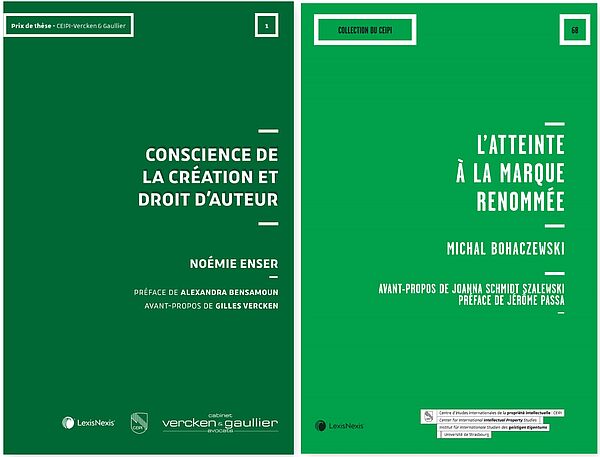The CEIPI is pleased to announce the release of two new publications:
- Michal Bohaczewski, Infringement of the Trade Mark with Reputation, CEIPI's Collection, 68, LexisNexis.
- Noémie Enser,Consciousness of creation and Literary and Artistic Property Law, CEIPI's Collection, PHD CEIPI Prize, 1, LexisNexis.
- Industrial Property Law
Infringement of the Trade Mark with Reputation offers an analysis that takes into account the French legislation modified by the ordinance n° 2019-1169 and having transposed the directive n° 2015/2436.
From now on, the protection of Trade Mark with Reputation is placed within the scope of the exclusive right and expressly provides that the infringement of a Trade Mark with Reputation constitutes a ground for nullity and, on opposition, a ground for refusal of a later mark.
By taking into account European Union law, the study takes into account the abundant case law of the Court of Justice and the General Court, as well as the practice of the European Union Intellectual Property Office (EUIPO) in invalidity and opposition procedures.
Michal Bohaczewski analyzes the fundamental concept of the Trade Mark with Reputation, distinguishes it from a well-known mark, examines the conditions of infringement of a Trade Mark with Reputation and presents the different forms of infringement recognized by the legislator: dilution, debasement and unfair advantage taken from the distinctive character or reputation of the mark.
- Literary and Artistic Property Law
According to Noémie Enser, Psychological awareness, this ability of human beings to understand their existence and the world around them, constantly raises questions, particularly in their relationship with the law.
Consciousness of creation and Literary and Artistic Property Law approaches this subject through a very specific prism: that of copyright, in which the doctrine seeks, through the conscience of the author, sometimes his discernment, sometimes a desire to create, sometimes again a real mastery of the creative process in order to make them play a discriminating role in access to protection.
The conscience of the author appears, throughout the analysis, not as a real condition, but as a corrective, called to play on the margins to exclude the protection by copyright of certain creations when the “classic” conditions for protection such as the form and the originality do not play their role of filter.
While the development of artificial intelligence and the welcome given to it by the artistic community call into question the place of a human being in creation, questioning the condition of the author’s conscience is part of a researchon the essence of copyright.
This work received the PHD CEIPI – Vercken & Gaullier Prize in 2022.
